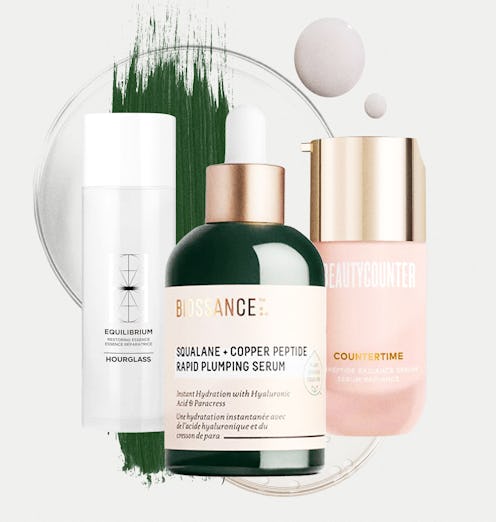(Back To Basics)
Ectoin Is The Skin Care Ingredient That’s Suddenly Everywhere — Here’s Why
Ideal for sensitive complexions.

With new products, brands, and categories popping up every day, beauty can be a bit overwhelming. Back to Basics is our rudimentary beauty series that serves as your crash course on the science behind some of the best formulations in the game. This week, we’re taking a look at ectoin for your skin.
Recently, the importance of the skin barrier has become a topic of increasing interest in the skin care space. Understanding the function of the barrier, and more importantly, how to maintain and restore one that has suffered significant damage has become a top priority for skin care devotees, and brands are churning out product after product as a result. But what does protection of the outermost layer of our skin look like in relation to one’s daily routine? For starters, it includes consistent use of products formulated with emollients and moisturizing compounds like ectoin.
Fairly new on the skin care scene, ectoin is quickly becoming a buzzy ingredient thanks to its restorative properties and ability to boost hydration at the barrier level. If you think that sounds like a lesson from your AP biology class, you’re absolutely right. Produced naturally in single-cell organisms, it aids in osmosis, one of the most basic biologic occurrences, which makes it unbelievable at balancing the barrier.
Ahead, TZR spoke with three dermatologists to learn more about the skin care benefits of ectoin and how to easily incorporate it into your routine.
What Is Ectoin?
Though it can be synthetically derived, ectoin is a natural compound that serves as osmolyte — a mixture of molecules meant to sustain the integrity of cells. It’s produced in several species of bacteria, but most commonly in salt-loving ones. This is important to note because of how it functions. As an osmolyte, it helps the organism survive extreme osmotic conditions in order to restore its normal cell volume.
What Are The Skin Benefits Of Ectoin?
Cosmetic dermatologist Dr. Paul Jarrod Frank, M.D., tells TZR that ectoin’s most beneficial attribute is the ability to provide protection to the cells that make up the skin’s layered barrier. “Its instinctual purpose is to bind to water in order to form protective complexes for the cellular membrane.” Put simply, ectoin helps cells maintain their ideal water balance which keeps skin nourished to improve elasticity and bounce.
There are a few other traits that make this compound a valuable asset in the quest for youthful-looking skin. Remember those osmotic conditions? Well, with a natural aptness to manage stress, ectoin is well suited to handle daily environmental stressors such as pollution and UVA or UVB light. “It’s also an amazing anti-inflammatory that can smooth rough skin while providing long-term hydration,” says board-certified dermatologist Dr. Aanand Geria, M.D., of Geria Dermatology.
Who Should Use Ectoin & What Are The Side Effects?
Whether naturally derived or created synthetically, ectoin is suitable for all skin types. And as Dr. Geria notes, it can be especially beneficial for dry skin or those who deal with sensitivity and irritation. If you fall into either of those categories, you can count on the antioxidant qualities to soothe inflammation while keeping you moisturized.
Regardless of your skin type, it’s always a good idea to patch test when trying ingredients. However, with no obvious adverse side effects, ectoin can seamlessly be incorporated into daily regimens (more on this below).
How To Use Ectoin In Your Routine
Considering its moisturizing characteristics, ectoin can be used daily with little to no issues and can even alleviate discomfort stemming from potentially irritating ingredients like vitamin C or retinoids. That said, there is a variety of different types of products formulated with ectoin, including serums, moisturizers, and eye creams. So how you incorporate it into your routine will simply depend on the medium you choose. “I recommend starting slowly and using during the day prior to sunblock and around the eyes to decrease inflammation,” says board-certified dermatologist Dr. Jeanine B Downie, M.D.
It’s important to note that despite guarding against UV radiation, ectoin does not provide adequate sun protection and should not be used as a substitute for SPF. “You should still apply a broad-spectrum sunscreen with at least SPF 30 every day,” says Dr. Geria.
Keep scrolling for a few ectoin skin care product suggestions to help narrow down the best method for your daily routine.
The Best Ectoin Skin Care Products
This article was originally published on